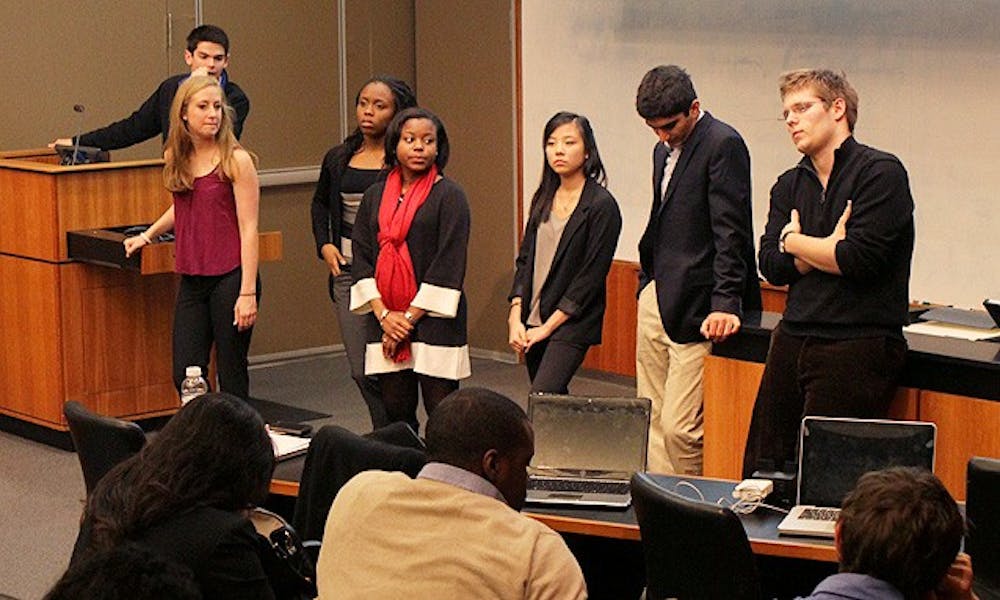Duke Student Government recapped projects during the Fall and set the tone for the Spring at its meeting Wednesday.
Each DSG vice president presented their respective committee’s projects to the Senate and discussed new goals for the coming semester. As a whole, DSG formulated a set of projects that students can expect to see in the coming months with changes concentrated in residence life, dining and Duke-Durham relations.
“My goals for the semester include implementing more programming, getting students more aware about the Durham experience and voting and improving the first-year experience,” said junior Alexandra Swain, vice president for Durham and regional affairs.
The Durham and regional affairs committee is looking to facilitate more community service projects, such as the Million Meals Project, where students assemble meal packages for those in need. The committee is also aiming to promote a Voter Awareness Week to encourage student participation in the upcoming election season. They will be working with Michael Schoenfeld, vice president of public affairs and government relations, to secure an on-campus voting site for the 2012 elections.
Swain added that her committee is also hosting a Staff Appreciation Day.
In addition, the residence life and dining committee is striving to increase awareness about the house model by tabling in the East Union Building and distributing pertinent information relating to the changes that have been made and how they will affect students. To establish unique identities for the houses, the residence life and dining committee also plans to work on the House Identity Initiative, set for next year.
The committee has been working with Panhellenic Association in order to improve campus facilities—specifically for Central Campus—including the exploration of alternative cable providers. The committee also seeks to implement goCharge stations—self-service mobile device charging kiosks—in the library to provide an efficient and easy way for students to charge their cell phones.
DSG members also discussed the creation of a real-time tracking system for the Duke buses that will allow students to visit a website to determine the approximate time of arrival and departure of buses from each of the campuses. The pilot bus tracking system will be launched this month under TransLoc, which specializes in delivering timely location information to riders and administrators of mass transit.
Senior Christina Lieu, vice president for athletics, services and the environment, said she is optimistic about the bus tracking system.
“Students will love the new system,” Lieu said. “Students have a lot to benefit from it, and students have been advocating for it for a while. It’s a big win for DSG.”
A tailgating committee, which will serve as the working group for next year’s football tailgating, will be implemented soon, largely in response to the lack of enthusiasm for the Football Gamedays that took place in the Fall. The committee will help discuss the location, an alcohol policy that abides by University standards, food and music for next year’s tailgating.
In other business:
Eight standard diesel buses were added to the Duke transportation fleet last year, and the average age of the buses decreased from 11-years to six years. The replacement occurred due to the older age of many of the buses and the multiple occurrences of buses catching fire over the past six years. Two hybrid-electric buses were added in November 2011.
Online course evaluations will be available starting next Fall and will be tested over the summer for student feedback.
In addition, virtual course synopses will be available on ACES, which will help students create their schedules by allowing them to view videos of various courses.
Get The Chronicle straight to your inbox
Signup for our weekly newsletter. Cancel at any time.

